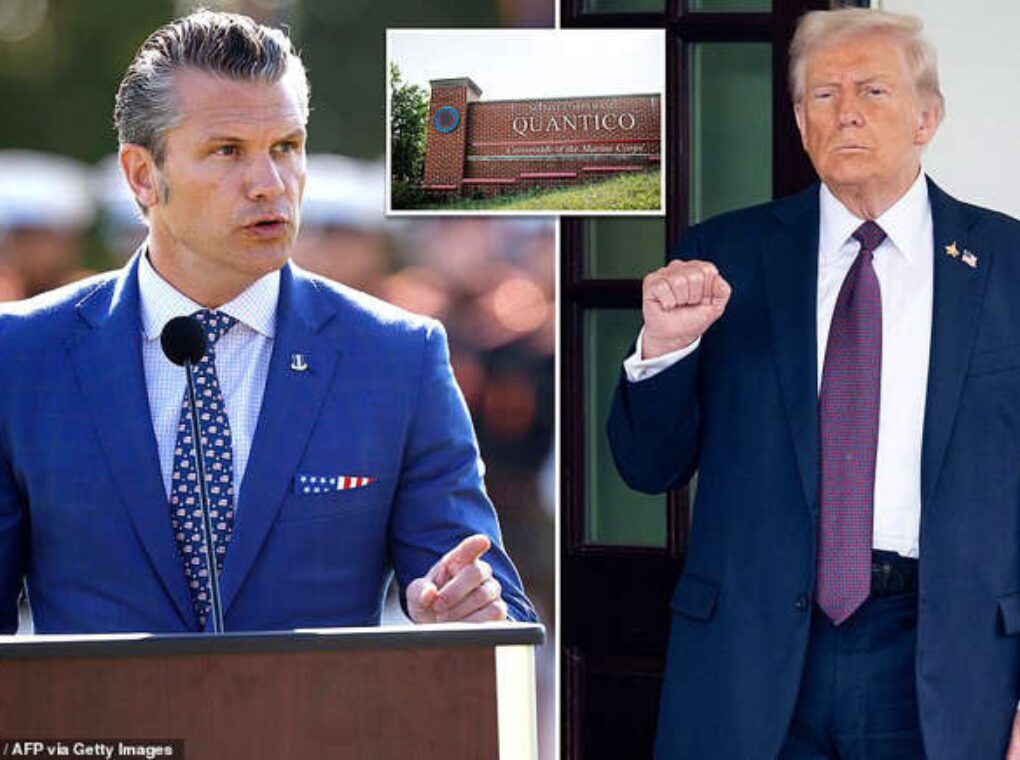In one of the most unusual and controversial events of recent U.S. military history, War Secretary Pete Hegseth on September 30 delivered a blunt and confrontational address to nearly 800 generals and admirals assembled at Marine Corps Base Quantico, Virginia.
The event marked the largest gathering of senior American officers since the run-up to the Iraq War in 2003, and its tone has triggered both praise and alarm.
Hegseth, a longtime Trump ally and former Fox News commentator, used the occasion to demand sweeping cultural and operational changes inside the armed forces. In a 45-minute speech laced with combative rhetoric, he called for purging what he described as “woke distractions,” reinstating tough fitness and grooming standards, and enforcing a hardened “warrior ethos.”
“If you don’t agree with this vision of lethality and accountability — resign,” Hegseth told the audience, according to multiple reports.
The secretary went further, ridiculing “stupid rules” that, in his view, had weakened readiness. Within hours, that phrase had gone viral on social media, with some claiming it was a declaration that the Pentagon intended to ignore international humanitarian law — specifically, the Geneva Conventions.
What He Said — and Didn’t Say
Despite the uproar, the record shows Hegseth did not explicitly mention the Geneva Conventions, nor did he announce that U.S. forces would abandon rules of engagement designed to protect civilians and prisoners of war.
Officials later clarified that his comments referred to internal Department of War regulations and bureaucratic hurdles rather than international treaties. However, the perception of a Pentagon chief brushing off “rules of war” was enough to inflame debate at home and abroad.
Progressive lawmakers like Senator Tammy Duckworth (D-IL) condemned the tone as “reckless and divisive,” while supporters praised Hegseth’s bluntness as a necessary corrective to years of what they see as declining standards in the military.
Escalation in the Shadows
The controversy over rhetoric came amid a series of concrete U.S. military moves that suggest a more aggressive posture toward Russia.
First, Washington is weighing whether to supply Tomahawk cruise missiles to Ukraine — long-range weapons capable of striking deep inside Russian territory. Vice President JD Vance confirmed that the option is on the table, although no delivery has yet been authorized. Moscow has warned that such a transfer would be seen as a dramatic escalation.
Second, satellite imagery confirmed that the U.S. Navy has deployed P-8 Poseidon patrol aircraft to Norwegian bases. These advanced maritime surveillance planes specialize in tracking submarines — a clear signal to Russia, whose undersea fleet has been active around the Baltic and Arctic.
Third, the United States and NATO have stepped up military activity in the Arctic. The recent Arctic Edge 2025 exercises simulated defense against Russian incursions, while B-52 bombers and fighter jets have conducted patrols near Norway. At the same time, NORAD reported intercepting multiple Russian surveillance flights off Alaska.
Together, these moves paint a picture of growing U.S. military assertiveness across Russia’s periphery, from Eastern Europe to the High North.
No Declaration of War — Yet
Despite the online frenzy, the United States has not declared war on Russia. Under the U.S. Constitution, only Congress can do so, and the last formal declaration came in World War II. What is unfolding now is a more ambiguous, but still dangerous, proxy conflict.
By authorizing Ukraine to strike Russian territory with U.S.-supplied weapons, deploying advanced aircraft closer to Russian borders, and considering the transfer of cruise missiles, Washington is walking a fine line. Each move is framed as “defensive,” yet each is read in Moscow as an offensive encirclement.
This dynamic — known to political scientists as the security dilemma — risks spiraling escalation. Defensive steps by one side appear threatening to the other, prompting countermoves that increase the danger of miscalculation.
A Cultural Purge or a War Footing?
Hegseth’s Quantico address, in this context, takes on an outsized significance. Was it merely a cultural reset — an internal crackdown on what he and his allies see as weakness inside the ranks? Or was it, intentionally or not, a signal that the U.S. is preparing its officer corps for a prolonged and potentially direct confrontation with Russia?
The answer may depend on what happens next. If Tomahawks are approved for Ukraine, if NATO deployments continue to expand in the Arctic and Baltic, and if the rhetoric about “stupid rules” hardens into policy, the world could find itself on the edge of Cold War II — or worse.
For now, the U.S. remains formally outside the war in Ukraine. But the symbolism of 800 generals summoned under one roof, lectured about toughness and loyalty, and overshadowed by talk of missiles and Arctic maneuvers, is difficult to ignore.
Hegseth’s speech may not have been a literal declaration of war. But in the fragile atmosphere of late 2025, it may well have sounded like one — both to America’s adversaries and to its uneasy allies.
